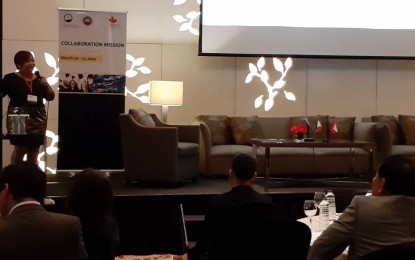
STUDENT EXCHANGE. Atty. Lily Fredia Milla, OIC Deputy Executive Director for Internatioal Affairs of the Commission on Higher Education, presents an overview of the Philippine higher education landscape and internationalization mandate, during the CHED and Canadian Bureau for International Education (CBIE) activity dubbed Collaboration Mission: Cebu, Philippines at the Radisson Blu Hotel, Cebu City. (Photo by John Rey Saavedra)
CEBU CITY — The Commission on Higher Education (CHED) on Thursday said the number of Filipinos studying in foreign countries has almost doubled compared to the data some 10 years ago.
Citing United Nations Educational, Scientific and Cultural Organization (UNESCO) data, Lawyer Lily Freida Milla, CHED officer in charge deputy executive director for international affairs, said 16,578 Filipino students studied abroad in 2018.
The data on the mobility of students in Asia and the Pacific, Milla said, has shown that such number of Filipinos registered as having attended college or university abroad in 2018 was almost double the 8,413 recorded in 2008.
Milla said most of the Filipino students were studying in the United States and Australia.
The figure is expected to grow because of CHED’s commitment to embrace “internationalization” of the colleges and universities under the commission’s supervision as well as the vibrant student exchange program in the country’s higher learning institutions, she said.
“We have international academic exchange program anchored on various memorandum of understanding, agreement, and collaboration with other educational commissions, ministries for international commitment to a university-to-university partnership,” she said.
Milla presented an overview of Philippine higher education landscape and internationalization mandate during an event of CHED and Canadian Bureau for International Education (CBIE) dubbed as Collaboration Mission: Cebu, Philippines at the Radisson Blu Hotel in this city.
The event ended on Thursday, March 21.
At present, Filipino students undergoing short-period student exchange program can be found in six countries within the Association of Southeast Asian (ASEAN) countries, including Japan and South Korea.
The government shoulders travel and allowance for the students who are undergoing student exchange program.
Also, “CHED shall pursue an internationalization strategy to make the Philippine higher education as important major player in global arena,” Milla said.
Among these strategies, she noted, is strengthening of their international relations office and expansion of collaboration and consortia with learning institutions abroad.
CHED also assists colleges and universities in the country in establishing and maintaining centers of excellence and centers of development.
MIlla said the national government through CHED also provides assistance in developing and sustaining internationalization program through the grant of academic exchange program for students, faculty, and school officials.
“Internationalization is a driver of quality institutions and internationalization can contribute to the economic and national competitiveness,” she said. (PNA)
